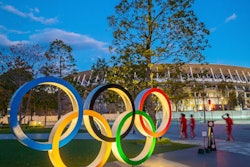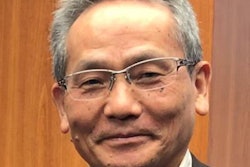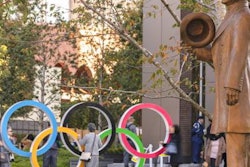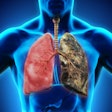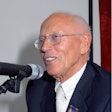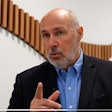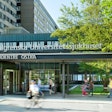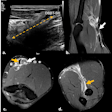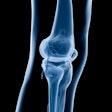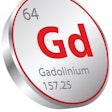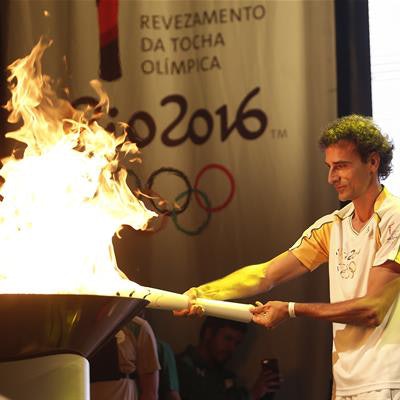
As the Olympic flame continues to burn brightly in Rio de Janeiro, the 1000th imaging examination was performed at the Olympics yesterday. An impressive 610 MRI scans were carried out on the first 12 days of the games, surpassing the total number completed throughout London 2012 and underlining the ever-greater reliance on MRI in elite sport.
Two MRI systems, four ultrasound machines, and three x-rays units are housed in the 3,500-sq-m polyclinic, which will stay open until the Paralympics finishes on 18 September. By the end of play on Tuesday, 345 x-rays and 130 ultrasound scan had been performed, and athletes' knees were by far the most common investigation (see graphic).
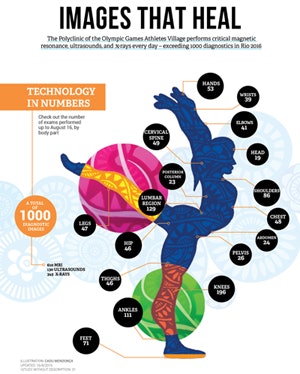
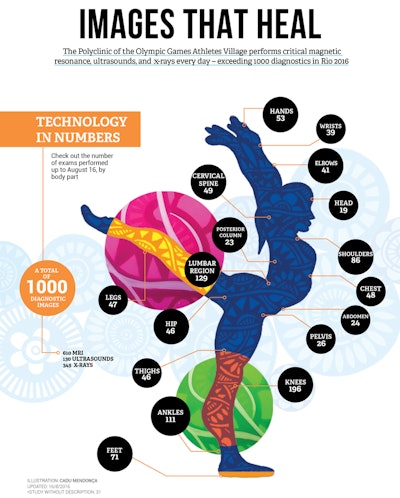
Types of investigations. Image courtesy of GE Healthcare.
Dr. João Grangeiro, chief medical officer of the Organizing Committee for the Olympic and Paralympic Games, singled out one particularly challenging case of near-blindness in a delegation leader.
"The Olympic Games have some delegations from countries that live in quite delicate situations. A member from Cameroon, for example, came in here and stared at everything," Grangeiro noted. "He said he only wanted a checkup, because access to quality medicine in his country is very expensive. We did all exams and were granted a smile of satisfaction that was thrilling. Here we give something they can't get in their countries."
On the busiest day, around 900 medical appointments were registered, surpassing the record high of 650 at London 2012. Athletes from African countries who are in vulnerable situations are the ones who attend the polyclinic the most, he said.
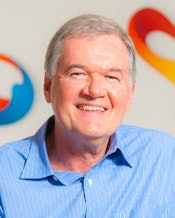 Dr. João Grangeiro has participated in nine Olympic Games. Image courtesy of Rio 2016.
Dr. João Grangeiro has participated in nine Olympic Games. Image courtesy of Rio 2016.The polyclinic includes rooms for physiotherapy, cryotherapy, and massage, as well as others dedicated to recovery from lesions, but the most sought-after services are ophthalmology and odontology. Production of personalized mouthguards is proving popular, and around 100 have been produced every day in the color chosen by the athletes.
"It's important to stress that they are not here just because the service is free, but because we are good at what we do. If somebody came in here and reported a bad service, I doubt people would come on the following day," Grangeiro said.
Prior to the start of games on 5 August, GE Healthcare installed two MRI systems (1.5-tesla Optima MR 450w and 3-tesla Discovery MR 750w), four ultrasound machines (Logiq E9 ultrasound with XD Clear, Logiq E, LOGIQe R7, Vscan dual), and three x-ray units (Discovery XR 656). A PACS, RIS, and Centricity Practice Solution electronic medical record (EMR) is also being used.
A CT scanner was available at London 2012 to guide interventional procedures, but was dispensed with for Rio 2016.
Proctor & Gamble is responsible for the odontology equipment. After the games, the equipment will be donated to public hospitals in Brazil.
"This will be our legacy," Grangeiro concluded.




